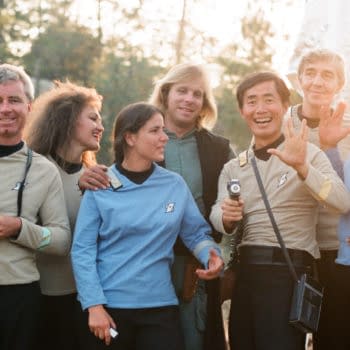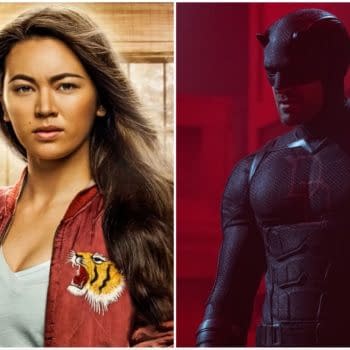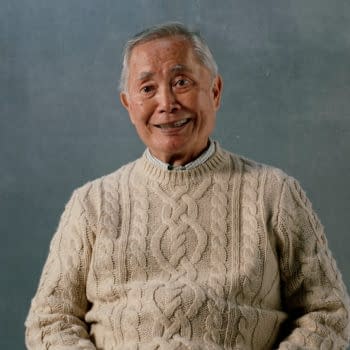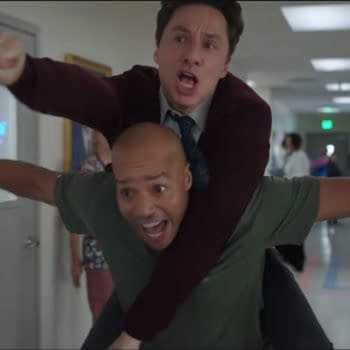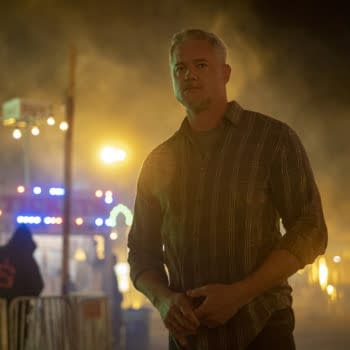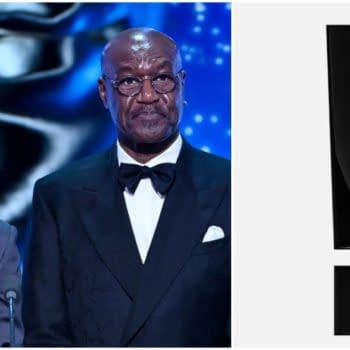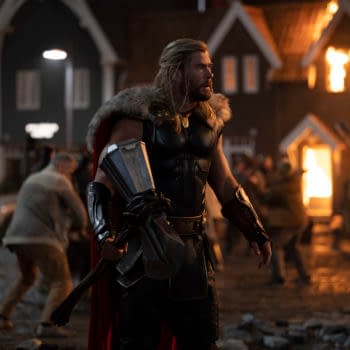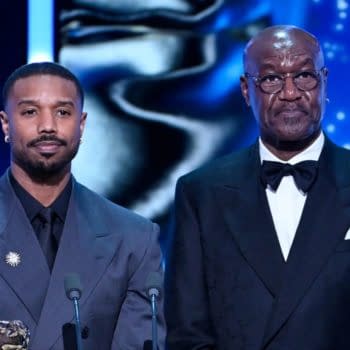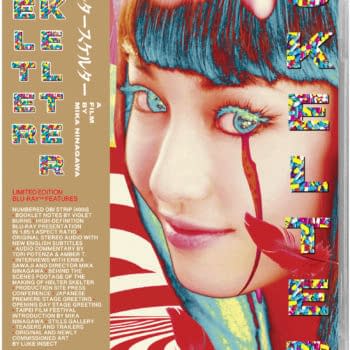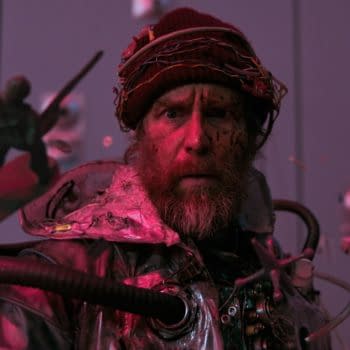Posted in: Exclusive, Interview, Lionsgate, Movies | Tagged: aaron eckhart, Bella Thorne, Graham Phillips, interview, marianne jean-baptiste, Parker Phillips, Phillips Brothers, Rumble Through the Dark
Rumble Through the Dark: Directors on Adapting The Fighter to Film
Directors the Phillips Bros talk to Bleeding Cool about adapting Michael Farris Smith's The Fighter to Lionsgate's Rumble Through the Dark.
Article Summary
- Graham and Parker Phillips discuss adapting "The Fighter" into the film "Rumble Through the Dark".
- Aaron Eckhart and Bella Thorne praised for their performances in lead roles.
- The cast's rigorous training and the impact of Hurricane Ida on the filming process discussed.
- Rumble Through the Dark is now showing in select theaters, and available on-demand from November 10th.
While there is no shortage of blue-collar masterpieces, directing duo and brothers Graham and Parker Phillips took on the task of adapting the critically acclaimed Michael Farris Smith 2018 novel The Fighter to film as Lionsgate's Rumble Through the Dark. The story follows Jack Boucher (Aaron Eckhart), a bare-knuckle cage fighter in the dark landscape of the Mississippi Delta, who seeks to repay his debts in a final, desperate attempt to salvage the family home of his dying foster mother. The Phillips brothers, who also had their share of time in front of the camera as actors as they do behind it as writers, directors, and producers, spoke to Bleeding Cool about bringing Smith's story to the big screen, Eckhart's training and physical presence, Bella Thorne and Marianne Jean-Baptiste's strong complementary intense performances, what didn't translate from the novel into film, fight choreography, and more.
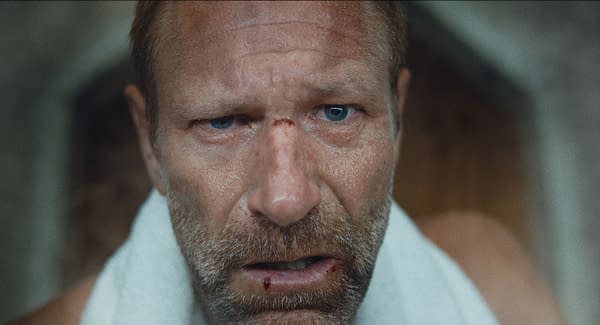
Bringing 'The Fighter' to the Screen in 'Rumble Through the Dark'
Bleeding Cool: Graham, Parker, what intrigued you guys about 'Rumble Through the Dark?'
Parker Phillips: We picked up the book first. About halfway through, we looked at each other. We knew this was something that we wanted to turn into a movie. Two things grabbed us immediately: first, it was a tale of redemption about no matter how many wrongs you have in life, the ability, if given a chance, to make up for them, how far will you go in taking that chance? Second, it was a story about love between a mother and a son, no matter how they came to be. That's an interesting dichotomy of this film and the tale it tells. That's what brought us to it.
What made Aaron and Bella perfect for their roles?
Graham Phillips: The lead role of Jack Boucher is a bit of a paradox. On the one hand, he is a fighter. He's someone who puts himself against the world no matter what the odds are. He's a dreamer who thinks that he has a strong sense of belief, and he has a hardness to him. On the other side, there's this introvert, and there's a boy that still lives within him. He went through the foster system and was bullied as a child. He's part gladiator and part man. Part of him is still the scared boy on the playground who wants someone to care for him.
Eckhart brought all of himself to this role, and he could encapsulate all of what this role needed. He was incredibly dedicated, and we were impressed. He brought a performance that showed a side that no one had seen before. We're excited about that. As for Bella, we didn't know what to expect in casting her. We had an initial meeting, and we were trying to feel her out with how dedicated she would be to this role. Did she get it? She completely flipped the tables on us, and she knew more about the character than we did from that initial meeting. We were so proud of the performance that she gave. It touched her in this role in a personal way. We feel like people will be surprised by what they see from both Bella and Aaron.
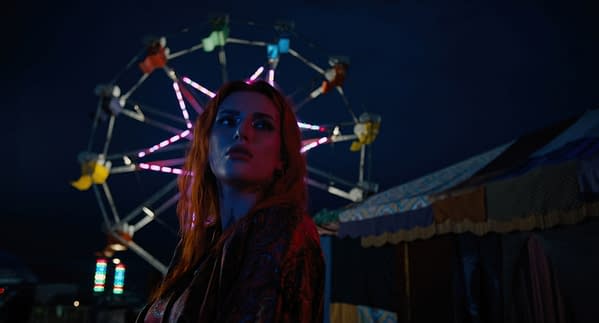
How did the rest of the cast come together? Was there an audition process, or were there people you had penciled in?
Parker: The third lead, our antagonist [Big Momma Sweet], was played by Marianne Jean-Baptiste. We felt lucky that our casting director [Pam Dixon] suggested her, and we weren't as familiar with their work. We were quick studies and watched the performance that got her a nomination for the Academy Award. We were blown away by her work both on stage and on screen, like Bella. We offered Marianne the role and then had a phone conversation. Like her, she also brought an aspect to that role that we never imagined, and we were blown away by her performance as the other actors who got to interact in the scenes with her. Marianne was exciting to have on set and in the other roles…Graham and I try and cast with people we know and reach trust. These are actors, for the most part, we worked with before, either on stage or in our past films or short films. If we couldn't cast the actors we knew, then we relied on our local casting director to find talent out in Mississippi, where we shot the film. We had a couple of brilliant performances from people we met in Natchez, Mississippi.
Graham, has your acting background helped in your directing?
Graham: People ask us a lot about the division of labor between the two of us since we're both directors, and it is a one-person job. It's interesting. We both work with the actors. Parker has more of a natural knack for it. A part of it is that he is a bit more of a calming presence in the room than I am. Frankly, what most actors need to know to feel comfortable is where to stand, know that they are safe, and that we have their back. Parker is good at that. I'm able to analyze the characters' psychologies in a way that is sometimes entertaining and useful. Sometimes, actors don't want to know how the sausage is made because it doesn't allow for as much mystery.
Parker: Graham's knowledge as an actor plays into how he interacts with the ones on set, but it informs how we shoot the film to be able to do. Graham can predict performances or also understand the motivations behind performances well, which inevitably then allows motivation into how the scene is blocked, shot, and designed. It all starts with an understanding of the material, which, as an intelligent actor, is helpful to have someone like Graham on your side.
Graham: Thank you.
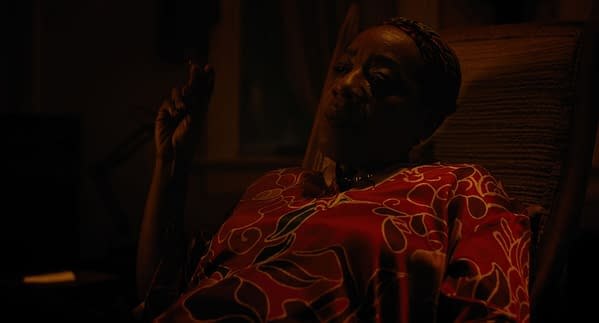
Was there any aspect of the book you couldn't retain that you wanted to in the film?
Graham: There were whole chapters in a novel where you'll describe someone's psychological processes, what they're dreaming about, or what they're thinking about that were rich in the book. [Book] Jack Bouchard is an introvert. Our lead character is also an introvert and a lot is happening in his head. He doesn't always show it outwardly. Part of what makes us fall in love with this character when we read the book has to do with us being allowed into his head. One of the biggest challenges when we were filming this was how to make people feel like they intimately knew this person. We're not using voiceover where we have a few flashbacks, but we use them sparingly to understand what's happening inside this character. It's not so much something that we had to cut out, but it's something that is not explicitly in the screenplay version of this. We felt it was up to us to capture and for Aaron to bring to the table.
A lot of the spirit of the film was about the fight choreography and the way the sequences were shot. Did Aaron do any method techniques or extensive training to get those sequences down?
Graham: [Aaron] did a lot of extensive training. He showed up two months before he started shooting to train in jiu-jitsu and boxing. He has a jiu-jitsu background and has spent a lot of his life in martial arts, which was something we were positive, surprised by, and happy to hear. He was incredibly dedicated, and he was training for hours a day. It seemed like he was training five to six hours a day for the better part of two months. It shows he was incredibly dedicated and he was in such good shape. It's essential for a role like this because you must believe this guy has a shot at winning despite the odds of being so against him. He gave his all into this role. That's for sure.
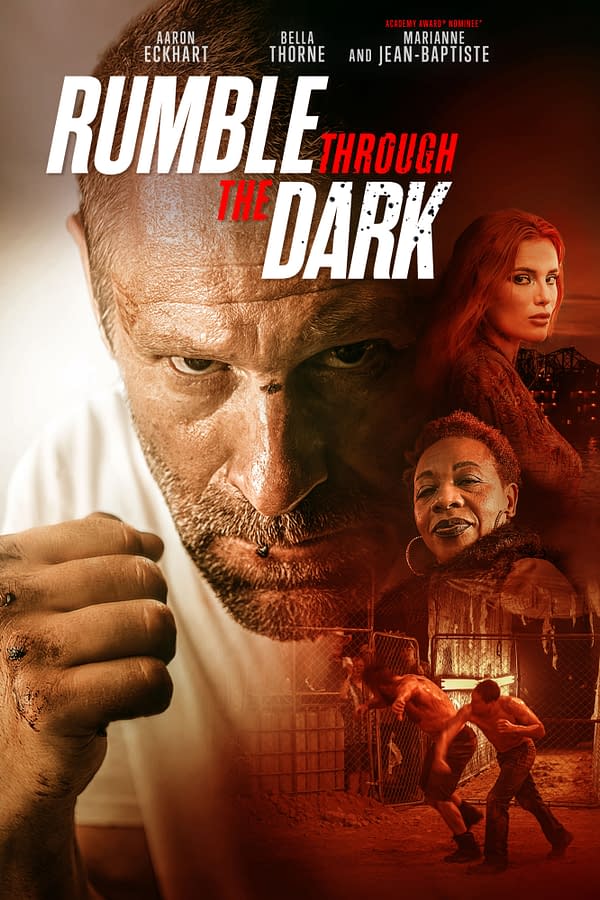
What was the most challenging sequence of the film, or just any aspects you had?
Parker: Probably the final fight. It was maybe three pages in the script but ended up being seven or eight minutes on screen, which is a long time for a fight. We initially had a couple of days blocked off for rehearsal, and we got hit. We were shooting in August and September in Natchez, Mississippi, and we got hit by Hurricane Ida that came through, and we had to stop shooting for a couple of days. It dumped a ton of water. Aaron was saying this house had a little creek around it, and when Hurricane Ida hit, it became this giant moat that almost would have protected a fortress.
Aaron couldn't get out the first day we had a rehearsal. He missed the second day because we couldn't rescue him. Finally, we got a big rig to tow him out, and he showed up on set. This natural event washed away our rehearsal time. We had to improvise a little bit, and luckily, we had incredible stunt coordinators, Lloyd Bateman and David Conk; both incorporated a lot of the fight that they had put together but also included what Aaron was able to do to bring to the table as a guy with a background in jujitsu. We came together as creatives and figured out how to do this fight, which we shot. We only had two and a half days to shoot. That was difficult, and the fight in and of itself is hard. There were a lot of extras and action. The fight has a three-act structure. We were shooting on dirt, and we had a rain machine, so the dirt quickly turned into mud. We were thrown into it, which was a challenge for all departments. It's what you do as filmmakers. You have all come together and figured out a way out of it.
Lionsgate's Rumble Through the Dark is currently in select theaters and will be available on-demand and digital on November 10th.






